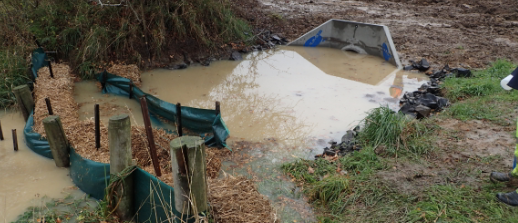New rules aim to manage run-off
Sue Wards
21 November 2022, 4:04 PM
 Stormwater discolouring the Clutha River enraged locals in 2017.
Stormwater discolouring the Clutha River enraged locals in 2017.New requirements have been introduced by the Otago Regional Council (ORC) to reduce sediment run-off from earthworks.
The new rules follow numerous instances around Otago of sediment being flushed off earthwork platforms into creeks, streams and lakes following heavy rainfall, the ORC said in a statement to media.
One of those incidents, in 2017, resulted in the owner of Wānaka’s Northlake development, and its contractors Civil Construction Limited, being fined for discharging silt and sediment-laden water (generated by earthworks in the subdivision) into the Clutha River by a natural flowpath.
Read more: Northlake fined for contaminating river
Northlake was fined $42,500 for the pollution, and then ORC chief executive Sarah Gardner said the sentencing highlighted the importance of improved environmental management during development.

New rules also mean consents are required for temporary culverts.
The new provisions in the ORC’s Regional Plan mean consents will be required in some situations, including for sediment from earthworks associated with urban residential developments, ORC consent team leader Jenny Ross said.
The new rules will give the ORC better oversight on the management of earthworks and enable it to more actively manage any sediment discharges which could go to water, she said.
For residential earthworks to be a permitted activity, developers must not expose more than 2,500 square metres of earthworks in any consecutive 12-month period per landholding and the earthworks must not be within 10 metres of a water body, drain, or water race.
The exposed earth must be stabilised on completion of the earthworks; Soil or debris must not be placed where it can enter a water body, drain, or race; and there must be no conspicuous change in colour, odour or significant effect on aquatic life.
Jenny said if developers cannot meet these requirements they will need to get a resource consent.
She also noted the National Environmental Standards – Freshwater, introduced in 2020, include a requirement to get consent for culverts, both temporary and permanent.
ORC compliance manager Tami Sargeant told the Wānaka App that under the new rules, the Northlake development would have required ORC resource consents.
“This would have considered where and how much land was exposed; what controls and plans were in place to minimise the risk of sediment loss; and potential adverse effects on water bodies, ecological values, other properties, human use or Kāi Tahu values,” she said.
Find more information on assessing resource consent requirements here.
If anyone sees pollution around Otago, they can contact the 24/7 ORC Pollution Hotline on 0800 800 033, or email [email protected].
PHOTOS: Supplied







